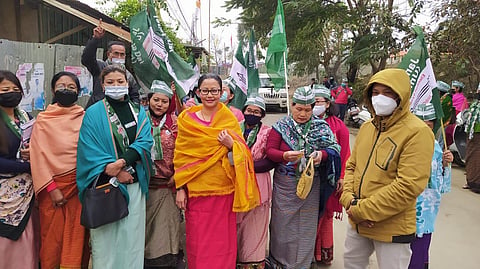

IMPHAL: A major poll issue in Manipur will remain invisible.
It is the demand of Scheduled Tribe (ST) status for the majority Meitei community. The Meiteis are dominant in two-thirds of the 60 constituencies straddled across the Imphal Valley.
Manipur is a mosaic of communities thereby, making the demand a hot potato for all political parties. As the issue threatens to be divisive in the diverse population, political parties have kept the demand out of their manifestos.
In the Imphal Valley, however, Meitei intellectuals and people on the streets are debating in favour and against the ST status demand.
Yamben Laba, a former chairperson of the Manipur Human Rights Commission, is now the advisor to the Scheduled Tribe Demand Committee Manipur. Laba feels that although most Meiteis are Hindus, they still follow the old tribal system.
“In fact, till 1935, the Meiteis were entered in the census of India as ST. In 1949-50 when the Constitution was drafted, former Assam Chief Minister Gopinath Bordoloi and JJ Nichols Roy of Meghalaya came to Manipur and asked whether the Meiteis wanted to be included as ST. They took the opinions of just three people – two Brahmins and a Sanskritised Meitei. They said how we can become ST because of the socio-economic lifestyles of the tribals,” Laba told The New Indian Express.
His said there was no “social mixing” between the Meiteis and the tribals in the olden days.
“The two Brahmins said we are a superior community,” Laba said, adding, “But our tribal traits and customs are still there. We are Hindus but still follow the old tribal system.”
“My concept is political for us. We are controlling Indian sports. So, if we become ST, we can produce over 100 bureaucrats and police officers in India in 10 years’ time. We can get a lot of jobs across categories,” he argued while favouring ST status for the Meiteis.
The reason for the demand is retaining power for a community with a shrinking geographical area to dwell.
“Meiteis, as a race, used to control areas up to Chindwin in Myanmar and Surma Valley in Bangladesh. Now, Meiteis are confined to 8% of Manipur’s geographical area. Tribals are infiltrating Imphal by putting up candidates in elections,” he said.
But few appear as determined as Laba. Prof L Rajen of Manipur University does not support the ST demand.
“Any form of such arrangement will not be good for the state in the long run. We need a certain mechanism where different competing groups agree to certain things,” said Rajen.
According to him, the demand for ST status is because the Meitei community wants jobs in the Central government sector but more importantly, because the community cannot buy land in the hill areas.
“If the Manipur Land Revenue and Land Reforms Act can be tweaked, there cannot be any concern surrounding ST. People among Meiteis opposed to ST status demand strongly feel that we have made achievements in the Indian political and social systems. We need to compete with the general category people. We are doing well in other areas. We have over 500 officers in the Army,” said Rajen.
He added that Hinduism has contributed a lot to the Meitei society.
Former police officer Thounaojam Brinda, who is contesting on a JD(U) ticket, said although the ST status demand has been raised by the Meitei and Meitei-Pangal communities, there is no consensus till now.
“ST status will ensure reservation for the two communities in terms of administrative posts. As regards land right, I don’t think it will have any effect,” she said.
Md Chingiz Khan, a Pangal Muslim who is a Ph.D scholar at the Jawaharlal Nehru University, New Delhi, said the Pangals need ST status because of backwardness and their geographical isolation. Pangal Muslims are an ethnic community mainly in the Imphal Valley.
“They are backward in all fields – politically, economically, educationally as well as socially. Pangals are a primitive community. They fulfill all parameters to get ST. They need ST for job reservation and for the protection of their land,” said Khan.
Lawyer Abhi Singh is concerned about the land for Meiteis.
“Our land can be bought by anybody but we cannot buy land in the hills. Ours is a small land and parts of it have already gone to other people. It is a relevant demand. Job is secondary although there is a serious unemployment problem in the valley,” said Singh.
Laba has a rationale that is linked to the development projects of the government. He fears that the advent of railways and the Asian highway connecting East Asia will bring in multi-national corporations which will buy land at a premium. “The Constitution of India protects land only if you are a tribal,” said Laba.
But a local activist, who spoke on the condition of anonymity, feels if the Meiteis are granted ST status, people will stop working hard.
As the debate continues, the tribal Naga and Kuki groups feel threatened by the valley population’s demand. “They already have more political powers because of more seats,” says a tribal leader.